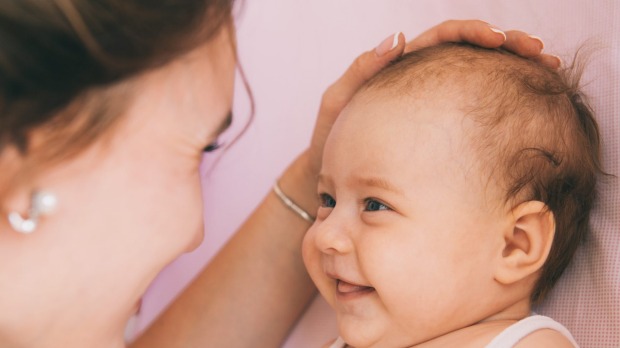Miles of smiles Photo: Shutterstock
Before she even became a mother, Clare knew she was going to speak to her babies from the “get go”.
As an Early Childhood Educator, Clare believes babies absorb language “like a sponge”, so she was keen to help them soak up as much as possible.
But Clare didn’t just focus on the words she used.
She was also mindful of the way she spoke, choosing to speak in a calm voice while smiling a lot.
“A smile injects encouragement into your voice. It says, ‘I’m here and I’m interested in you’. Mostly, for my children, it led to alert and plentiful interactions.”
Clare believes the joy she conveyed while smiling was also “contagious” and led to lots of smiles and laughter in return from her babies.
But, like any parent, Clare wasn’t always calm and happy.
Whenever she felt stressed or exhausted, she found she spoke “harshly” – usually to herself.
“This always led to stressed and tearful babies, who were then incredibly difficult to settle.”
That didn’t surprise her.
“While a positive voice helps a child to feel safe, encourages interaction and supports their developing attachment, a negative tone is more likely to create a sense of caution and withdrawal – especially when that’s the norm.”
New research supports Clare’s beliefs.
Published in the journal Infancy in July this year, the research suggests that babies can tell if you’re smiling when you’re talking – even if they don’t understand what you’re saying.
For the study, Dr Titia Benders, Lecturer in Linguistics and Deputy-Director of the Child Language Lab at Macquarie University, found that six month-old babies preferred listening to sentences with raised spectral frequencies (which happens when you’re smiling), rather than lower ones (which happen when you frown).
You can try it yourself by making the sound ‘sss’ while smiling versus frowning. When smiling, you’ll notice the sound is higher in frequency.
“Adults may think you have to speak in a high-pitched voice to attract babies’ attention,” said Dr Benders.
“These findings suggest parents can mix it up if they’re trying to get their child’s attention – namely by smiling when they speak.”
These findings make sense to Kirstin Bouse.
The clinical psychologist and author of The Conscious Mother says babies are “extremely attuned” to their mothers and know if their mum is smiling when talking to them.
Naturally, she believes it’s best to speak to babies in a “warm and loving” voice.
While talking to your baby in a loving voice is a great way to help her feel safe and calm, Bouse says there are plenty of other ways you can reassure your little one.
Eye contact and touch are pivotal.
“In fact, there is a fair amount of research from years gone by clearly demonstrating how important gentle and loving physical touch for a baby to thrive.
“Chatting, singing, playing, cuddling, tickling, holding and baby massage are wonderful ways to connect and communicate with your baby.”
But, just because babies can tell when you’re smiling, doesn’t mean you have to slap on a grin every time you go near your little one.
“We cannot be perfect and we simply don’t have to be perfect,” Bouse reassures.
“We can raise very happy, loving and capable children by being ‘good enough’. So raising your voice now and then is not something to beat yourself up about.

